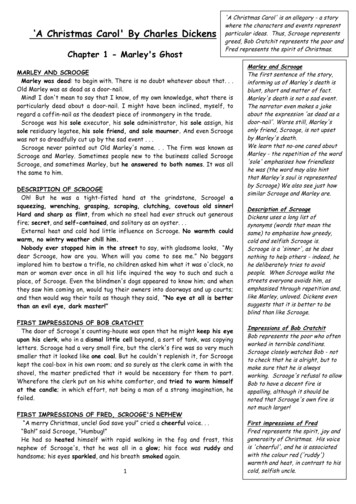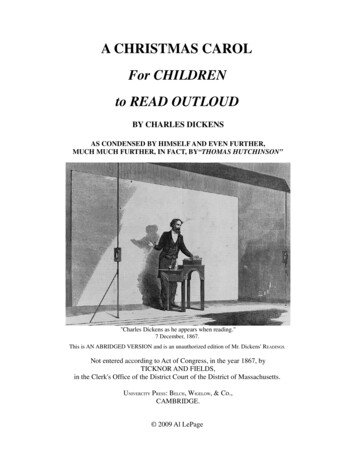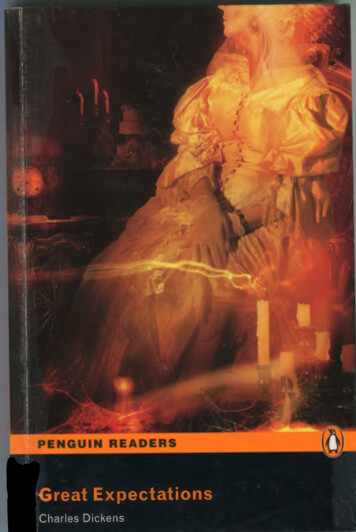
Transcription
reat ExpectationsCharles Dickens
9,sc- Burro-Great ExpectationsCHARLES DICKENSLevel 6Retold by Latif DossSeries Editors: Andy Hopkins and Jocelyn PotterELEFANTAENGLISHTIPS.ORG
Pearson Education Lim itedEdinburgh Gate, Harlow,Essex CM20 2JE, Englandand Associated Companies throughout the world.ISBN: 978-1-4058-6528-9First published in the Bridge Series 1950This adaptation first published by Addison Wesley Longman Limitedin the Longman Fiction Series 1996First published by Penguin Books 1999This edition first published 20083 5 7 9 10 8 6 4 2This edition copyright Penguin Books Ltd 1999This edition copyright Pearson Education Ltd 2008Typeset by Graphicraft Ltd, Hong KongSet in ll/1 4 p t BemboPrinted in ChinaSW TC/02A ll rights reserved; no part of this publication may be reproduced, storedin a retrieval system, or transmitted in any form or by any means,electronic, mechanical, photocopying, recording or otherwise, without theprior written permission of the Publishers.Published by Pearson Education Ltd in association withPenguin Books Ltd, both companies being subsidiaries of Pearson PicFor a complete list of the tides available in the Penguin Readers series please write to your localPearson Longman office or to: Penguin Readers Marketing Department, Pearson Education,Edinburgh Gate, Harlow, Essex CM20 2JE, England.
ContentspageIntroductionChapter 1Chapter 2Chapter 3Chapter 4Chapter 5Chapter 6Chapter 7Chapter 8Chapter 9Chapter 10Chapter 11Chapter 12Chapter 13Chapter 14Chapter 15Chapter 16Chapter 17Chapter 18Chapter 19VI Am Told to StealI Rob Mrs JoeThe Two Men on the MarshesMr Pumblechook Tastes Tar WaterThe Convicts Are ChasedI Am to Go and Play at MissHavisham’sI Visit Miss Havisham and MeetEstellaI Try to Be UncommonI Fight with a Pale Young GentlemanJoe at Miss Havisham’sOld OrlickI Tell Biddy My SecretsI Have Great ExpectationsIn London with the PocketsJoe Comes to Barnard’s InnEstella Has No HeartI Open My Heart to HerbertI Take Estella to RichmondWe Fall into Debt1356101317232529343840465356616367
Chapter 20Chapter 21Chapter 22Chapter 23Chapter 24Chapter 25Chapter 26Chapter 27Chapter 28Chapter 29I Come of Age70Estella and Miss Havisham Opposed72My Strange Visitor77Provis and Compeyson81Miss Havisham s Revenge85A Satisfactory Arrangement for Provis88Estella s Mother91I Learn More of Provis s History94I Am Trapped95Our Plan of Escape and How itFailed99Chapter 30 Death of Provis103Chapter 31 The Best of Friends104Chapter 32 For Estella s Sake107Activities109
ELEFANTAENGLISHTIPS.ORGIntroductionM y earliest memory is of a cold, wet afternoon towards evening. A t such atime I found outfor certain that this windy place under the long grass wasthe churchyard; and that my father; mother and five little brothers weredead and buried there. . .Pip, the central character in this story, has lost both his parentsand is being brought up by his sister and her husband, ablacksmith who takes Pip as an apprentice and teaches him histrade. When Pip is young he is powerless against the injusticesof life, but his meetings with a beautiful young woman calledEstella make him desire more than his simple home with Mr andMrs Joe GargeryAnd then the boys fortunes suddenly change when a secretbenefactor provides him with money. He is able to move toLondon, receive an education and live as a gentleman. At thattime, Pip is not always true to himself. Although he knows thatJoe Gargery is a good man, he is embarrassed when Joe comesto London. Joe does not fit in with Pip s new life, and Pip ismore concerned about his old friend s lack of manners than hisfeelings.However, Pip must constantly reconsider his own position,especially when, one day, he makes a surprising discovery. Hehas, he realizes, deceived himself about the source of his ‘greatexpectations’.As Pip grows up, he begins to understand that dreams, wealthand grand plans do not always bring happiness. But will he learnto recognize the difference between true and false friends? Andwill he appreciate that beauty, wealth and excitement are lessimportant than love and loyalty?v
Charles Dickens is one of the most popular writers of all time,and the creator of some of the best-known characters in Englishliterature.Dickens was born in Portsmouth, in England, in 1812 andmoved to London with his family when he was about two yearsold. His mother taught him to read and helped him to develop adeep love of books.The family was very poor, and John Dickens, a clerk withthe navy, could not earn enough to support his wife and eightchildren. In 1824 he was put in prison for his debts so, at the ageof twelve, Charles was forced to leave school. He went to work ina shoe polish factory to help support his family.Charles was eventually able to leave the factory after a relativeleft some money to his father, who paid his debts and was releasedfrom prison. Charles attended Wellington House school for twoyears before going back to work as a clerk, but the difficultiesthat the family suffered and the general hopelessness that he sawaround him shaped his view of the world and strongly influencedthe subject matter, events and characters in his later writing.Determined to leave the life of insecurity behind him, Dickensstarted writing for newspapers, and he soon became known as areporter in London s courts and in the Houses of Parliament.His first literary success came, though, with the publication —inmonthly parts — of The Pickwick Papers (1837). By the age oftwenty-four Dickens was famous, and he remained famous untilhe died.In contrast to his public success, Dickens’s personal life wastroubled. He married Catherine Hogarth in 1836 and they hadten children together. However, as time passed they becameincreasingly unhappy, and they separated in 1858.After his marriage with Catherine ended, Dickens movedpermanently to his country house near Chatham. A relationshipwith a young actress called Ellen Ternan lasted until his deathVI
in 1870. Charles Dickens was buried in Westminster Abbey, inLondon.Dickens was a man of enormous energy. As well as writing twentyfull-length fictional stories and many works of non-fiction, hefound the time to support a number of organizations that helpedthe poor. This concern for disadvantaged people and poor socialconditions is reflected in much of Dickens’s work. He also touredEngland and the United States, giving popular theatrical readingsof his best-known novels.Dickens had all the qualities needed by a great novelist.He was an accurate observer of people and places, had a greatunderstanding of human nature, and was particularly sympathetictowards young people. He was at his best describing charactersand scenes which were typical of life in mid-nineteenth-centuryLondon. His stories demand the reader’s interest and are full ofhumour as well as tragedy.Most of Dickens’s novels originally appeared in weekly ormonthly parts in newspapers and magazines. By presenting hiswork in this way, Dickens reached people who would nevernormally buy full-length books.Oliver Twist (1838) is one of his most famous early books and isbased on the adventures of a poor orphan, unloved and uncaredfor. It was very influential at the time it was published becauseit showed the workings of London’s criminal world and howthe poor were forced to live. The private school system is themain subject of Nicholas Nickleby (1839), another early novel.Dickens himself had experienced this shocking world of money making school owners who mistreated their pupils and taughtthem nothing.Then, during the 1840s, Dickens wrote five Christmas books.The first of these, A Christmas Carol, tells the story of rich,mean Ebenezer Scrooge who, late in life, learns the meaning of
Christmas and discovers happiness by helping others less fortunatethan himself. Oliver Twist and A Christmas Carol are both PenguinReaders; Nicholas Nickleby (and Oliver Twist) can be found in thePenguin Active Reading series.In his later works, including Hard Times (1854), Little Dorrit(1857) and Our Mutual Friend (1865), Dickens presented a muchdarker view of the world. His humour is crueller as he reveals theunpleasant depths of human nature and experience, particularlythe inhuman social consequences of industry and trade. BleakHouse (1853) shows the unfairness of the legal system and howlawyers extended the legal process for their own benefit, withoutany regard for their clients. David Coppeifield (1850, also a PenguinReader) is unusual in this period; an emotional description of ayoung mans discovery of adult life, it is a much more light hearted story.Dickens wrote Great Expectations (1861) when his own life wastroubled because he was in the process of separating from his wife,but it is, nevertheless, a brilliant novel. Like David Copperfield, it isthe story of a boy growing up. Dickens used his own memoriesof childhood to take the reader right inside Pip s mind. We livethrough the events and discoveries of his life with him.Early reviewers criticised the novel. Some of them disliked theexaggerated plot and characters. Readers loved it, though, andthe 1861 version was reprinted five times.The subjects of the novel are equally important in thetwenty-first century Dickens shows the ways in which greedand ambition can ruin peoples lives. He asks which is mostimportant: honour or success? He examines social problems suchas the difficulties faced by the poor and uneducated, and thebig differences between the lives of rich and poor people. Buthowever unattractive some of his characters are - in this andhis other novels —few of them are really evil. Dickens was very
aware that human beings are complex creatures whose behaviouris often affected by past experiences and influences. Even MissHavisham, the old lady in this novel who desires revenge on allmen, has a reason for her wickedness.Great Expectations is a story of excitement and danger, adventureand murder, but most of all of self-discovery. When Pip has madea life for himself, he must painfully rethink the values on whichhe has built that life. Meanwhile, the reader will enjoy meetingthe wide variety of characters in the story: not only rich andeccentric Miss Havisham, beautiful but heartless Estella and kind,honest Joe Gargery; but also many others whose influence shapesPip s life in deep and sometimes mysterious ways.
Chapter 1 I A m Told to StealMy fathers family name being Pirrip, and my Christian namePhilip, my infant tongue could make of both names nothinglonger than Pip. So I called myself Pip, and came to be called Pip.Having lost both my parents in my infancy, I was brought up bymy sister, Mrs Joe Gargery, who married the local blacksmith.Ours was the marsh country, down by the river, within 20miles of the sea. My earliest memory is of a cold, wet afternoontowards evening. At such a time I found out for certain that thiswindy place under long grass was the churchyard; and that myfather, mother and five little brothers were dead and buried there;and that the dark flat empty land beyond the churchyard was themarshes; and that the low line further down was the river; andthat the distant place from which the wind was rushing was thesea, and that the small boy growing afraid of it all and beginningto cry was Pip.‘Hold your noise,’ cried a terrible voice, as a man jumped upfrom among the graves.‘Keep still, you little devil, or I’ll cut yourthroat.’A fearful man, in rough grey clothes, with a great iron on hisleg. A man with no hat, and with broken shoes, and with an oldpiece of cloth tied round his head. He moved with difficulty andwas shaking with cold as he seized me by the chin.‘Oh! Don’t cut my throat, sir,’ I begged him in terror. ‘Please,don’t do it, sir.’‘Tell me your name,’ said the man. ‘Quick!’‘Pip, sir.’‘Once more,’ said the man, staring at me. ‘Speak out.’‘Pip. Pip, sir.’‘Show me where you live,’ said the man. ‘Point out the place.’1
I pointed to where our village lay, a mile or more from thechurch.The man, after looking at me for a moment, turned meupside down and emptied my pockets. There was nothing inthem but a piece of bread, which he took and began to eathungrily.‘You young dog!’ said the man, talking as he ate noisily. ‘Whatfat cheeks you’ve got!’I believe they were fat, though I was at that time small for myyears, and not strong.He asked me where my father and mother were. When I hadpointed out to him the places where they were buried, he askedme who I lived with. I told him I lived with my sister, wife of JoeGargery, the blacksmith.On hearing the word ‘blacksmith’ he looked down at his legand then at me. He took me by both arms and ordered me tobring him, early the next morning at the old gun placements, ametal file and some food, or he would cut my heart out. I wasnot to say a word about it all. ‘I’m not alone,’ he said, ‘as you maythink I am. There’s a young man hidden with me, in comparisonwith whom I am kind and friendly. That young man hears thewords I speak. That young man has a secret way, particular tohimself, of getting at a boy, and at his heart. No boy can hidehimself from that young man.’I promised to bring him the file, and what bits of food Icould, and wished him goodnight. He moved away towards thelow church wall, putting his weight on his one good leg, got overit, and then turned round to look for me. When I saw himturning, I set my face towards home, and made the best use of mylegs.2
Chapter 2 I Rob Mrs JoeMy sister, Mrs Joe Gargery, was more than 20 years older than I,tall bony and plain-looking, and had established a great reputa tion with herself and the neighbours because she had brought meup ‘by hand’. Having at that time to find out for myself what theexpression meant, and knowing her to have a hard and heavyhand, and to be much in the habit of laying it on her husband, aswell as on me, I supposed that Joe Gargery and I were bothbrought up by hand.Joe was a fair man, with light brown hair and blue eyes. Hewas a calm, good-natured, foolish, dear fellow.When I ran home from the churchyard, Joe’s forge, which wasjoined to our house, was shut up, and Joe was sitting alone in thekitchen.Joe and I being fellow sufferers, he told me that my sister hadbeen out a dozen times looking for me, and that she had gotTickler (a stick) with her. Soon after that he saw her coming, andadvised me to get behind the door, which I did at once.My sister, throwing the door wide open, and findingsomething behind it, immediately guessed it was me, and beat mewith her stick. She concluded by throwing me at Joe, who, gladto get hold of me on any terms, passed me on into the chimneycorner and quickly put himself between her and me.Where have you been, you young monkey?’ said Mrs Joe,stamping her foot. ‘Tell me immediately what you’ve been doingto wear me away with fear and worry, or I’d have you out of thatcorner if you were 50 Pips, and he was 500 Gargerys.’I have only been to the churchyard,’ said I, crying andrubbing myself.Churchyard!’ repeated my sister. ‘If it wasn’t for me you’dhave been to the churchyard long ago, and stayed there.’She turned away and started to make the tea; she buttered a3
loaf, cut a very thick piece off, which she again cut into twohalves, of which Joe got one, and I the other.Though I was hungry, I dared not eat mine, for I had to havesomething in reserve for the frightening man on the marshes, andhis friend, the still more frightening young man. I took advantageof a moment when Joe was not looking at me, and got my breadand butter down the leg of my trousers.Joe was shocked to see my bread disappear so suddenly, andthought that I had swallowed it all in one mouthful. My sisteralso believed this to be the case, and insisted on giving me agenerous spoonful of a hateful medicine called “Tar Water”,which she poured down my throat.The guilty knowledge that I was going to rob Mrs Joe and,the constant need to keep one hand on my bread and butter as Isat or walked, almost drove me out of my mind. Happily Imanaged to slip away, and put it safely in my bedroom.On hearing big guns fired, I inquired from Joe what it meant,and Joe said, ‘Another convict s escaped. There was a convict offlast night, escaped from the hulks, and they fired warning of him.And now it appears they are firing warning of another.’I kept asking so many questions about convicts and hulks thatmy sister grew impatient with me, and told me that people wereput in hulks because they murdered and robbed and lied, and thatthey always began by asking questions.As I went upstairs in the dark to my bedroom I kept thinkingof her words with terror in my heart. I was clearly on my way tothe hulks, for I had begun by asking questions, and I was going torob Mrs Joe.I had a troubled night full of fearful dreams, and as soon as theday came I went as quietly as I could to the kitchen, which wasfull of food for Christmas. I stole some bread, a hard piece ofcheese, some sugared fruits, some whisky from a stone bottle,(adding water to replace what I had taken), a bone with very4
Ilittle meat on it, and a beautiful round meat pie, which I thoughtnot intended for early use, and would not be missed for sometime.Having also taken a file from among Joe’s tools in the forge, Iran for the misty marshes.lAvyChapter 3 The Two Men on the MarshesIt was a freezing cold morning, and very wet. On the marshes themist was so heavy that gates and fences appeared unexpectedlyand seemed to rush towards me.I was getting on towards the river, but however fast I went, Icouldn’t warm my feet. I knew my way to the gun placements,but in the confusion of the mist I found myself too far to theright, and had to turn back along the riverside. Suddenly I sawthe man sitting in front of me. His back was towards me, and hehad his arms folded and was nodding forward, heavy with sleep.I thought he would be more pleased if I came upon him withhis breakfast, in that unexpected manner, so I went forward softlyand touched him on the shoulder. He instantly jumped up, and itwas not the same man, but another man.And yet this man was dressed in rough grey clothes, too, andhad an iron on his leg, and was shaking with cold, and waseverything that the other was, except he had not the same face.He swore at me and hit out wildly but missed me. Then he ranaway and disappeared into the mist.its the young man!’ I thought, feeling my heart jump as Iidentified him.1 was soon at the gun placements after that, and there was theright man waiting for me. He was very cold, and his eyes lookedawfully hungry. As soon as I emptied my pockets he startedforcing the food I had brought into his mouth, pausing only to5
take some of the whisky. He shook with cold as he swallowedbread, cheese, fruit and meat pie, all at once, staring distrustfully atme and often stopping to listen to any sounds coming throughthe mists. Suddenly he said: ‘You’re not a deceiving little devil?You brought no one with you?’‘No, sir. No.’‘Nor did you tell anyone to follow you?’‘No.’‘Well,’ said he, ‘I believe you. You’d be a young dog indeed, ifat your time of life you could help to hunt a pitiful man like me.’As he sat eating the pie, I told him that I was afraid he wouldnot leave any of it for the young man. He told me withsomething like a laugh that the young man didn’t want any food.I said that I thought he looked as if he did, and that I had seenhim just then, dressed like him and with an iron on his leg, and Ipointed to where I had met him. He asked excitedly if he had amark on his left cheek, and when I replied that he had, heordered me to show him the way to him and, taking the file fromme, he sat down on the wet grass, filing at his iron like amadman. Fearing I had stayed away from home too long, Islipped off and left him working hard at the iron.Chapter 4 Mr Pum blechook Tastes Tar WaterI fully expected to find a policeman in the kitchen waiting to takeme away. But not only was there no policeman, but no discoveryhad yet been made of the robbery.Mrs Joe was very busy getting the house ready for Christmasdinner. We were to have a leg of meat and vegetables, and a pairof stuffed chickens. A large pie had been made yesterdaymorning, and the pudding was already on the boil. Meanwhile,Mrs Joe put clean white curtains up, and uncovered the furniture6
sitting room across the corridor, which was neverat any other time. Mrs Joe was a very cleanhousekeeper, but somehow always managed to make hercleanliness more uncomfortable than dirt itself.Mr Wopsle, the clerk at church, was having dinner with us;and Mr Hubble, the wheel-maker, and Mrs Hubble; and UnclePumblechook (Joes uncle, but Mrs Joe called him her uncle),who was a well-to-do corn dealer in the nearest town and hadhis own carriage. The dinner hour was half past one. When Joeand I got home from church, we found the table laid, and MrsJoe dressed, and the dinner being prepared, and the front doorunlocked for the company to enter by, and everything mostperfect. And still not a word of the robbery.The dinner hour came without bringing with it any relief tomy feelings, and the company arrived.‘Mrs Joe,’ said Uncle Pumblechook, a large, hard-breathing,middle-aged, slow man, with a mouth like a fish, dull staring eyesand sandy hair standing upright on his head, ‘I have brought you,to celebrate the occasion —I have brought you, madam, a bottleof white wine —and I have brought you, madam, a bottle of redwine.’Every Christmas Day he presented himself with exactly thesame words, and carrying the same gift of two bottles. EveryChristmas Day, Mrs Joe replied, as she now replied, ‘Oh, UnclePumblechook! This is kind!’ Every Christmas Day, he replied, ashe now replied,‘It’s no more than you deserve. And now are youall in good spirits, and how’s the boy?’ meaning me.We ate on these occasions in the kitchen, and then returnedto the sitting room for the nuts and oranges and apples. Amongthis good company I should have felt myself, even if I hadn’tstolen the food, in a false position. Not because I was seateduncomfortably at the corner with the table in my chest and Mr1 uniblechook’s elbow in my eye, nor because I was not allowed the littleu n c o v ere d7
to speak (I didn’t want to speak), nor because I was given thebony parts of the chickens and the worst parts of the meat. No, Iwould not have minded that, if they would only have left mealone. But they wouldn’t leave me alone. They seemed to thinkthe opportunity lost, if they failed to point the conversation atme, every now and then, and stick the point into me.It began the moment we sat down to dinner. Mr Wopsle said ashort prayer which ended with the hope that we might be trulygrateful. Upon which my sister fixed me with her eye, and said, ina low voice, ‘Do you hear that? Be grateful.’‘Especially,’ said Mr Pumblechook, ‘be grateful, boy, to thosewho brought you up by hand.’Joe’s position and influence were weaker when there wascompany than when there was none. But he always aided andcomforted me when he could, in some way of his own, and healways did so at dinnertime by giving me gravy, if there was any.There being plenty of gravy today, Joe spooned onto my plate, atthis point, about half a pint.‘He was a world of trouble to you, madam,’ said Mrs Hubble,sympathizing with my sister.‘Trouble?’ repeated my sister. ‘Trouble?’ and then entered on afearful catalogue of all the illnesses I had been guilty of, and allthe acts of sleeplessness I had committed, and all the high places Ihad fallen from, and all the low places I had fallen into, and all theinjuries I had done myself, and all the times she had wished mein my grave, and I had continually refused to go there.‘Have a little whisky, Uncle,’ said my sister.Oh dear, it had come at last! He would find it was weak, hewould say it was weak, and I was lost. I held tight to the leg of thetable under the cloth, with both hands, and waited for what Iknew would happen.My sister went for the stone bottle, came back with it, andpoured his whisky out; no one else taking any. He took up his
glass looked at it through the light, put it down —extended mymisery. All this time Mrs Joe and Joe were clearing the table forthe pie and pudding.I couldn’t keep my eyes off him. Still holding tight to the legof the table with my hands and feet, I saw the miserable creaturetake up his glass, smile, throw his head back, and drink the whiskyall at once. Instantly, the company was seized with unspeakableterror, because of his springing to his feet, turning round severaltimes in a wild coughing dance, and rushing out at the door; hethen became visible through the window, violently coughing,making the most terrible faces and appearing to be out of hismind.I held on tight, while Mrs Joe and Joe ran to him. I didn’tknow how I had done it, but I had no doubt I had murdered himsomehow. In my awful situation, it was a relief when he wasbrought back, and, surveying the company all round as if they haddisagreed with him, sank down into his chair shouting,‘Tar!’I had filled up the bottle with Tar Water. I knew he would beworse by and by.‘Tar!’ cried my sister in amazement. ‘Why, how ever could Tar1 come there?’Uncle Pumblechook asked for hot gin-and-water. My sister,who had begun to be alarmingly thoughtful, had to employherself in getting the gin, the hot water and the sugar, and mixingthem. For the time at least, I was saved.By degrees everything became calm again and I was able toeat a little pudding along with everyone else. By the time thecourse was finished Mr Pumblechook had begun to look a littlehappier - no doubt helped by the generous amounts of gin-andwater he had drunk.You must taste,’ said my sister, addressing the guests with her est §race, ‘you must taste, to finish with, Uncle Pumblechook’sWonderful gift!’9
Must they! Let them not hope to taste it!‘You must know,’ said my sister, rising, ‘it’s a pie: a tasty meatpie.’My sister went out to get it. I heard her steps proceed to thepantry. I saw Mr Pumblechook balance his knife. I felt that Icould bear no more, and I must run away. I released the leg of thetable, and ran for my life.But I ran no farther than the front door, for there I ranstraight into a party of soldiers with their guns, one of whomheld out a pair of handcuffs to me, saying, ‘Here you are, comeon!’Chapter 5 The Convicts Are ChasedThe arrival of the soldiers caused the dinner party to rise fromtable in confusion, and caused Mrs Joe, reentering the kitchenempty-handed, to stop short and stare, shouting, ‘Goodness me,what’s happened to the pie?’‘Excuse me, ladies and gentlemen,’ said the sergeant,‘I am on achase in the name of the King, and I want the blacksmith.’ Thesergeant then explained that the lock of one of the handcuffs hadgone wrong, and as they were wanted for immediate service, heasked the blacksmith to examine them. On being told by Joe thatthe job would take about two hours, the sergeant asked him toset about it at once, and called on his men to help.I was extremely frightened. But, beginning to realize that thehandcuffs were not for me, and that the arrival of the soldiers hadcaused my sister to forget about the pie, I pulled myself togethera little.Mr Wopsle asked the sergeant if they were chasing convicts.‘Ay!’ returned the sergeant.‘Two. They’re pretty well known to beout on the marshes still, and they won’t try to get clear of them10
before d a r k . Anybody here seen anything of them?’E v ery b o d y except myself said no, with confidence.N o b o d y thought of me.Joe h ad got his coat off, and went into the forge. One of thesoldiers lit the fire, while the rest stood round as the flamestu rn e d the coals red. Then Joe began to hammer and we alllo o k ed on.At last, Joe’s job was done, and the hammering stopped. As Joeput on his coat, he suggested that some of us should go downwith the soldiers and see the result of the hunt. Mr Wopsle saidhe would go, if Joe would. Mrs Joe, interested in knowing allabout it and how it ended, agreed that Joe should go, and allowedme to go with him.Nobody joined us from the village, for the weather was coldand threatening, with darkness coming on, and the people hadgood fires indoors and were staying in. A cold rain started to fallas we left the churchyard and struck out on the open marshes,and Joe took me on his back.The soldiers were moving on in the direction of the old gunplacements, and we were moving on a little way behind them,when, all of a sudden, we all stopped. For there had reached us onthe wings of the wind and rain, a long shout. It was repeated.There seemed to be two or more shouts raised together. As wecame nearer to the shouting, we could hear one voice callingMurder!’ and another voice, ‘Escaped convicts! Runaways!Guard! This way for the runaway convicts!’dhen both voices would seem to be drowned in a struggle,and then would break out again. When they heard this, thesoldiers ran in the direction of the voices, and Joe too.Here are both men!’ shouted the sergeant, struggling towardstwo men fighting like animals.‘Give up, you two! Come apart!’Water and mud were flying everywhere, and blows wereeing struck, when some more men went down to help the11
sergeant, and dragged out, separately, the convict I had spokenwith and the other one. Both were bleeding and shouting andstruggling; but of course I knew them both at once.‘Remember!’ said my convict, wiping blood from his facewith his torn shirt, and shaking hair from his fingers.‘I took him!I give him up to you! Remember that!’‘It’s not much to be particular about,’ said the sergeant. ‘Itwon’t do you much good, my man, being a runaway convictyourself. Handcuffs there!’The other convict looked in a terrible state.‘Take notice, guard - he tried to murder me,’ were his firstwords.‘Tried to murder him?’ said my convict. ‘Try, and not do it? Itook him, and gave him up; that’s what I did. I not onlyprevented him from getting off the marshes, but I dragged himhere —
Dickens wrote . Great Expectations (1861) when his own life was troubled because he was in the process of separating from his wife, but it is, nevertheless, a brilliant novel. Like . David Copperfield, it is the story of a boy growing up. Dickens used his own memories of chil
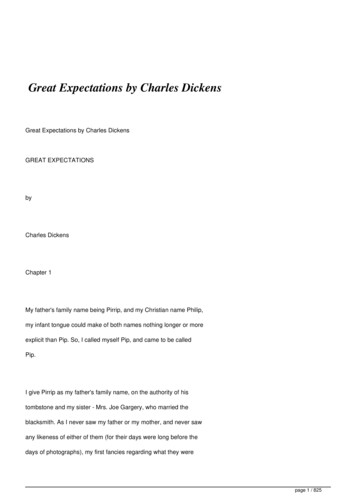
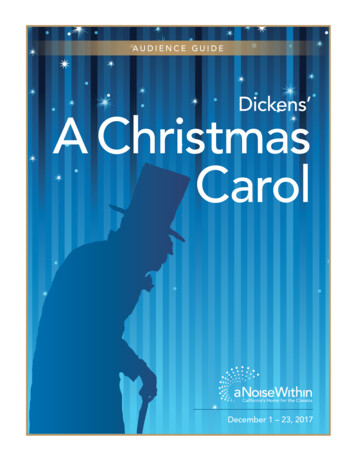
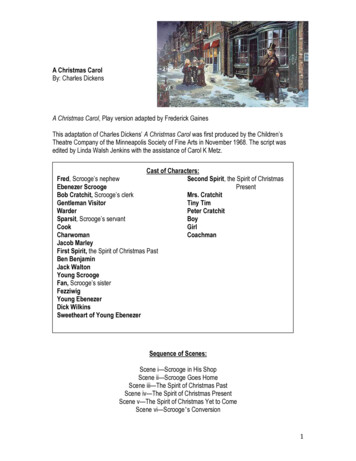
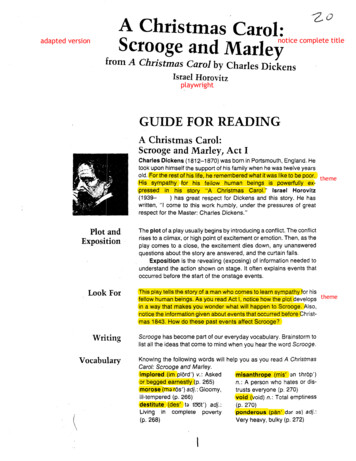
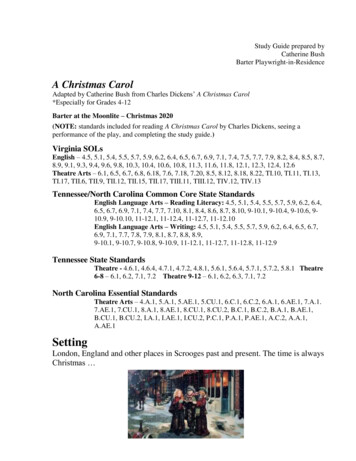
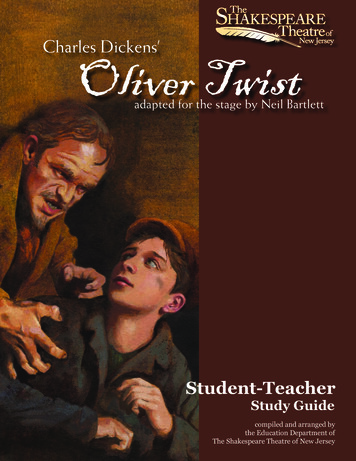
![The Book of the Damned, by Charles Fort, [1919], at sacred .](/img/24/book-of-the-damned.jpg)


